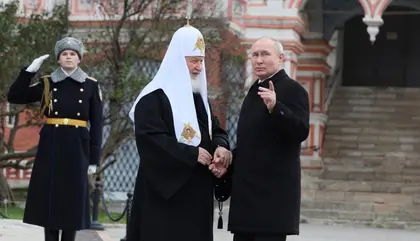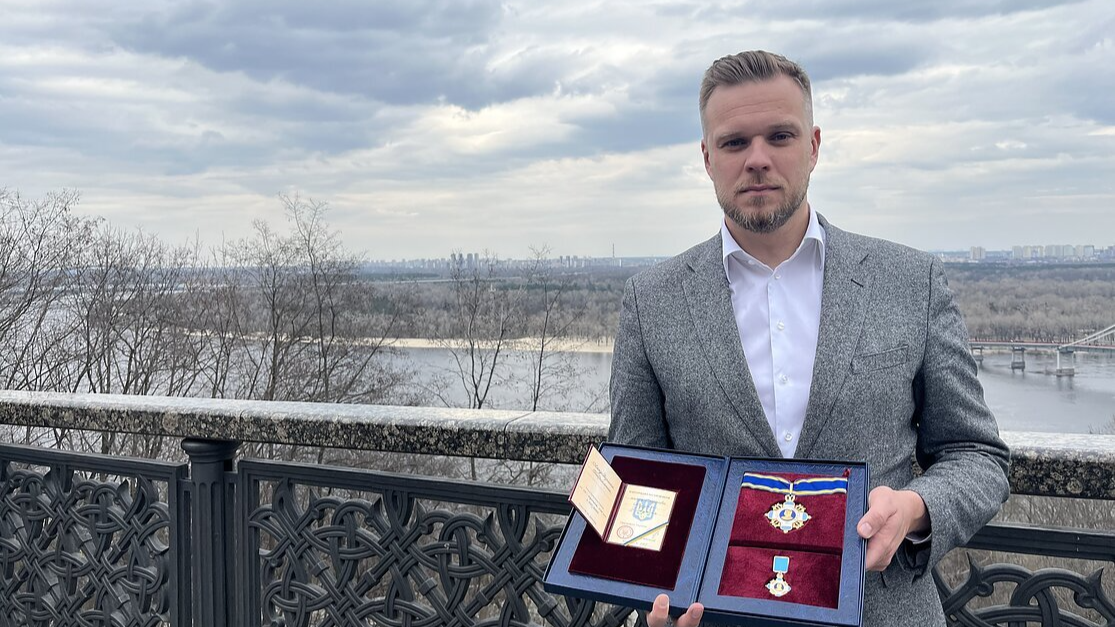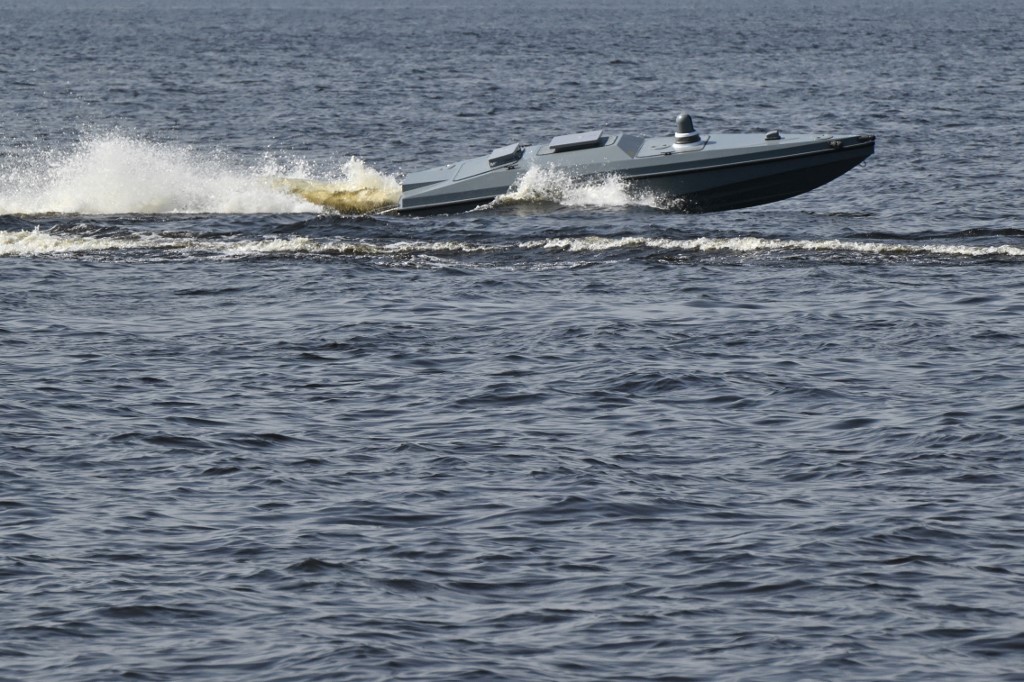The Russian Orthodox Church Moscow Patriarchate (ROC MP), a Kremlin-controlled organization and a known tool within the Russian hybrid warfare toolkit, held the World Russian People’s Council in Moscow on March 27 and 28 and approved an ideological and policy document tying several Kremlin ideological narratives together in an apparent effort to form a wider nationalist ideology around the war in Ukraine and Russia’s expansionist future.
ROC MP Head Patriarch Kirill, reportedly himself a former Soviet Committee for State Security (KGB) officer and a known staunch supporter of Russian President Vladimir Putin, chaired the congress of the World Russian People's Council that approved the document, and Kirill likely coordinated the document’s ideological narrative and policy recommendations with the Kremlin.
JOIN US ON TELEGRAM
Follow our coverage of the war on the @Kyivpost_official.
The document, "The Present and Future of the Russian World,” addresses Russian legislative and executive authorities with specific calls to amend Russian policy documents and laws. These calls are likely either attempts to socialize desired Kremlin policies among Russians before their implementation or to test public reactions to policies that Kremlin officials are currently considering.
Putin and Kremlin officials have gradually attempted to elaborate on amorphous ideological narratives about the war in Ukraine and their envisioned geopolitical confrontation with the West since the start of the full-scale invasion, and the ROC MP appears to be offering a more coherent ideological framework for Russians.

Finnish Authorities To Search Tanker Over Suspected Baltic Cable Cut
The ROC MP released the document a week after the Crocus City Hall terrorist attack and roughly a month before the start of the Orthodox Easter Holy Week, and likely aims to seize on heightened anxieties following the terrorist attack and increased Russian Orthodoxy observance to garner support for its desired ultranationalist policies and ideological vision.
The ROC MP intensified Kremlin rhetoric about Russia’s war in Ukraine and cast it as an existential and civilizational “holy war,” a significant inflection for Russian authorities who have so far carefully avoided officially framing Russia’s invasion of Ukraine as any kind of “war.” The ROC MP called Putin’s “special military operation” a holy war (Svyashennaya Voyna) and a new stage in the Russian people’s struggle for “national liberation...in southwestern Russia,” referencing eastern and southeastern Ukraine.
The ROC MP claimed that the Russian people are defending their lives, freedom, and statehood; their civilizational, religious, national, and cultural identity; and their right to live within the borders of a single Russian state by waging Putin’s war of conquest in Ukraine.
The ROC MP argued that the war in Ukraine is a holy war because Russia is defending “Holy Russia” and the world from the onslaught of globalism and the victory of the West, which has fallen into Satanism.
The ROC MP asserted that the war in Ukraine will conclude with Russia seizing exclusive influence over the entire territory of modern Ukraine and the exclusion of any Ukrainian government that the Kremlin determines to be hostile to Russia.
The ROC MP’s description of Russian goals is in line with repeated Kremlin statements indicating that Putin retains his objective to destroy Ukrainian sovereignty and statehood. The ROC MP’s use and description of the holy war in Ukraine is also consistent with Kremlin efforts to frame the war as an existential national struggle against Ukraine and the collective West but notably expands the alleged threats that defeat in Ukraine poses for Russians.
The term “holy war” may also conjure allusions to the Great Patriotic War (the Second World War), as the Soviet Union’s unofficial war anthem shared the same name, and the Kremlin has routinely invoked the mythos of the Great Patriotic War to generate domestic support for the war in Ukraine.
The Kremlin has continued to stress that the war in Ukraine is a “special military operation,” however, and the ROC MP’s direct acknowledgment of the conflict as a holy war may elicit support from Russians who have found the Kremlin’s comparatively restrained rhetoric uninspiring. The ROC MP did not define the holy war as a purely Orthodox concept and instead tied it to the Kremlin’s purposefully broad conception of who is a part of the Russian nation and Russkiy Mir (Russian World).
Ukrainian victory does not pose these existential threats, however, as Ukraine’s struggle to restore its territorial integrity, return its people, and defend its national identity does not infringe on Russian identity, statehood, or territorial integrity.
The ROC MP called for the codification of elements of the Russkiy Mir and may be gauging public support for the formal inclusion of ethnic Ukrainians and Belarusians in the Kremlin’s concept of the Russian nation. The ROC MP stated that Russia is the “creator, support, and defender” of the Russkiy Mir and that the Russkiy Mir is a “spiritual, cultural, and civilizational phenomenon” that transcends the borders of the Russian Federation and historical Russian lands and encompasses everyone that values Russian traditions and culture.
The ROC MP claimed the Russkiy Mir’s mission is to destroy and prevent efforts to establish “universal hegemony in the world” and that the reunification of the “Russian nation” should be one of the priorities of Russian foreign policy.
The ROC MP stated that Russia should return to the “trinity doctrine” of the Russian nation, which falsely asserts that the “Russian nation” is comprised of sub-groups of ethnic Russians, Belarusians, and Ukrainians whom Russia should reunify.
The ROC MP called on Russia to codify the “trinity doctrine” in law, make it an “integral part” of the Russian legal system, include it in the “normative list” of Russian spiritual and moral values, and give the concept legal protection.
Putin and other Kremlin officials have consistently invoked similar claims about the “Russian people” and Russkiy Mir since before the full-scale Russian invasion of Ukraine as a means to justify Russian aggression against Ukraine while undermining Ukraine’s sovereignty and territorial integrity and denying the existence of a Ukrainian ethnic identity. The ROC MP may be gauging the response to the idea of codifying the “trinity doctrine” on the Kremlin’s orders. The Kremlin may codify this doctrine as official Russian policy.
The ROC MP heavily emphasized Russia’s need for traditional family values and an updated migration policy to counter Russia’s ongoing demographic crisis. The ROC MP labeled Russia’s demographic crisis as Russia’s main existential threat and characterized steady demographic growth as a critical national security priority. The ROC MP asserted that Russia should aim to grow its population to 600 million people (a roughly 450 million increase) in the next 100 years and laid out a series of measures that it envisions would allow Russia to achieve this monumental task.
The ROC MP called for the revival of the “traditional large family” and traditional family values in Russia – echoing Russian President Vladimir Putin’s emphasis on 2024 as the “Year of the Family” in recent major national addresses. The ROC MP claimed that the Russian government should recognize the family and its well-being as Russia’s “main national development goal” and a “strategic national priority” and should amend Russia’s main strategic planning documents to reflect this. The ROC MP called on Russian popular culture to create a “cult of the family” in society and suggested various economic benefits the state should enact to encourage larger families.
The ROC MP claimed that a new state migration policy is also key to an “effective” demographic policy. The ROC MP complained that migrants who do not speak Russian, do not understand Russian history and culture, and cannot integrate into Russian society are “deforming” Russia’s unified legal, cultural, and linguistic space. The ROC MP alleged that the “uncontrolled” influx of migrant labor decreases the “indigenous” population’s wages and access to jobs and that “closed ethnic enclaves” are “breeding grounds” for corruption, organized crime, extremism, and terrorism.
The ROC MP offered a series of policy recommendations that Russia should prioritize in a new migration policy, including “significant” restrictions on low-skilled foreign laborers, guarantees of employment and high incomes for Russian citizens, protections of the rights and interests of ethnic Russians, and other indigenous peoples of Russia, the mass repatriation of "compatriots” to Russia, and the relocation of highly-skilled foreign specialists who are loyal to Russia and ready to integrate into Russian society.
The ROC MP’s demographic and migration policy suggestions continue to highlight how the Kremlin struggles with inconsistent and contradictory policies concerning migrants and the interests of its ultranationalist population. Select Russian officials and ultranationalist voices have recently called for Russia to enact anti-migrant policies following the Crocus City Hall terrorist attack, but ISW continues to assess that Russia is unlikely to introduce any restrictions that would reduce the number of migrants in Russia given that Russia continues to heavily rely on migrants to offset domestic labor shortages and for force generation efforts.
Putin asserted in December 2023 that Russia’s “compatriots abroad” are those who have historical, cultural, or linguistic ties to Russia, and the ROC MP appears to suggest that the repatriation of such “compatriots” to Russia could be a large resource Russia could tap into to solve its demographic crisis. Some of the ROC MP’s other policy recommendations, however, contradictorily seek to restrict some of the very migrants that would fall under Putin’s definition of “compatriots abroad.” The ROC MP’s approach to the Russkiy Mir appears to be at odds with Putin’s previous definition of Russkiy Mir which posits a diverse and inclusive Russian civic nationalism.
The ROC MP appears to be combining previously parallel Kremlin narrative efforts into a relatively cohesive ideology focusing on national identity and demographic resurgence that promises Russians a period of national rejuvenation in exchange for social and civic duties.
The ROC MP highlighted that “the restoration of the unity of the Russian people” through the war in Ukraine is a key condition for Russia’s survival and successful development throughout the 21st century. This call for restoration amounts to the full-scale destruction of the Ukrainian nation and its envelopment into Russia.
The ROC MP aims to also envelop ethnic Belarusians into the Russian nation through its conception of the “trinity doctrine” while also massively repatriating other “compatriots” abroad. The ROC MP’s calls for Russians to assume the responsibility for steadily increasing birth rates and averting demographic catastrophe similarly promises Russians that Russian sovereignty and identity will persist in the 21st century.
These efforts to expand Russia’s control over those it considers to be a part of the Russkiy Mir, whether through mass repatriation or forceful means like Russia’s war of conquest in Ukraine, serve the same purpose as the calls for Russians to increase birth rates — increasing Russia’s overall population with people that ultranationalists consider to be “Russian.”
The ROC MP argued that the establishment of a stable and sovereign Russkiy Mir under the Russian state will lead to economic opportunity and Russia’s role as one of the leading centers of a multipolar world order. The ROC MP stated that the typical embodiment of the Russkiy Mir after the promised national rejuvenation would be a Russian family with three or more children and their own single-family home, offering ordinary Russians future socioeconomic benefits in exchange for sacrifices made now in backing the ROC MP’s suggested ultranationalist ideology and achieving Russia’s “unification” with Ukraine and Belarus.
The ROC MP’s suggested ideology explicitly ties Russian national security to the preservation of an imagined and disputed Russian nation and Russian demographic growth, offering the Kremlin expanded justifications for acts of aggression against neighboring countries and the West in the name of protecting the overall size and growth of the imagined Russkiy Mir.
The Kremlin may choose not to fully align itself publicly with the ultranationalist ideology that the ROC MP has proposed at this time but will highly likely borrow from and leverage it to generate support for the war effort in Ukraine and any future acts of aggression against Russia’s neighbors and the West.
See the original here.
You can also highlight the text and press Ctrl + Enter









